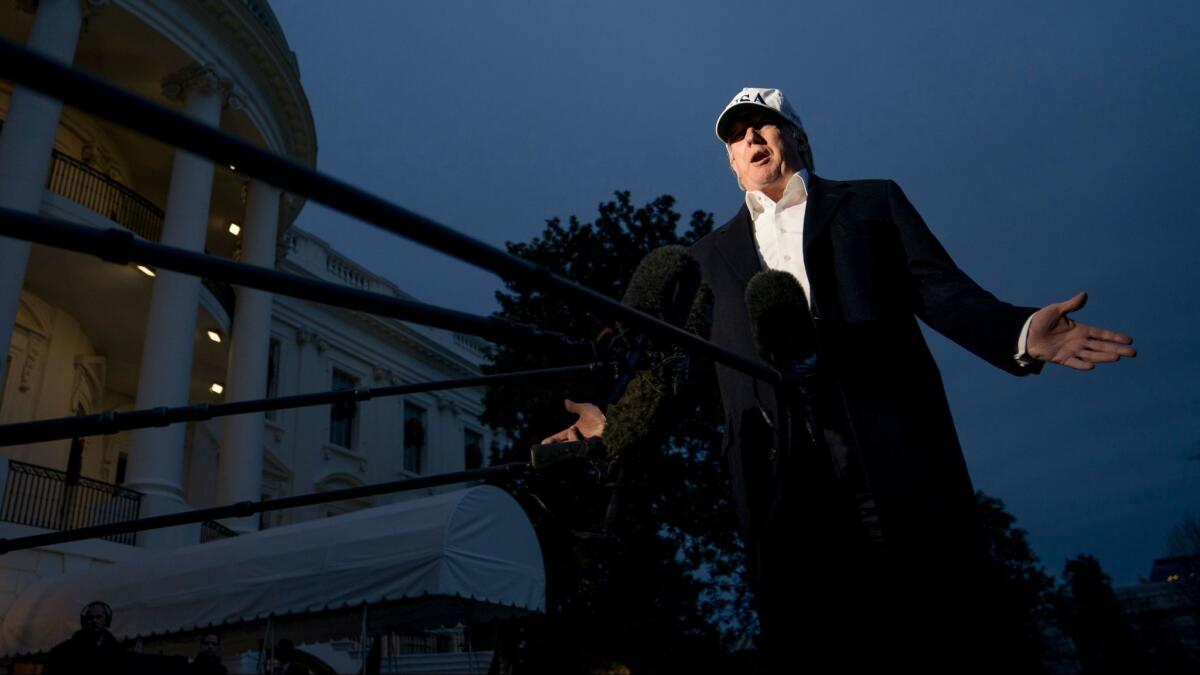Op-Ed: It’s the perfect time to fire Robert Mueller

- Share via
Rumors are flying that President Trump will try to fire special counsel Robert S. Mueller III by the end of the year.
Although this nightmarish prospect can’t be counted as likely, and Trump insists he’s not contemplating it, there are several reasons why he will not see a better time to lower the boom — and the White House has surely taken them into account.
First, there are strong signs that Mueller may soon indict Jared Kushner, the president’s son-in-law and advisor. Kushner’s lawyer has been quietly shopping for a crisis response team of the sort brought on board for criminal prosecutions. Kushner’s indictment would be a disaster for the president: Either his son-in-law goes to prison, or cooperates by providing the mother lode of inculpatory information. Probably no one, except possibly Donald Trump Jr., knows more about Trump’s activities as president, candidate and entrepreneur. (Remember that Deutsche Bank, whose records Mueller recently subpoenaed, lent Kushner $285 million in addition to its highly questionable loans to Trump.)
The coordinated onslaught against the FBI and Justice Department from the Hill lends Trump a measure of cover for moving to shut down the investigation.
Second, the coordinated onslaught against the FBI and Justice Department from the Hill lends Trump a measure of cover for moving to shut down the investigation. Republican Sen. John Cornyn of Texas, the majority whip, recently joined the chorus with a demand that “Mueller … clean house of partisans.” Never mind that the attacks are 100% bogus: Anti-Hillary Clinton sentiment among FBI agents in 2016 far outstripped — in quantity and quality — any mutterings against Trump. Equally bogus is the recent charge that Mueller improperly obtained emails of the Trump transition: There is no 4th Amendment protection of transition emails, which are on government servers with government addresses, and no executive privilege since the Trump team was not yet in office. These counterfeit arguments are strictly for public relations purposes.
Third, Congress is about to leave town for Christmas break, leaving Washington at its sleepiest and least prepared for a nimble response.
Fourth, Trump’s lawyers have scheduled a meeting with Mueller’s team for later this week, and the script has already been written. Trump’s team will ask about the progress of the investigation and when it will end; Mueller’s side will respond that there has been significant progress but there is still much to do and they cannot estimate an end date. Trump will then have his rabble-rousing talking point. For months, Trump’s lawyers and the White House staff have been claiming that, as Press Secretary Sarah Huckabee Sanders reiterated just Friday, “[w]e expect this process to wrap up soon.” There never was any basis for the expectation, which experienced prosecutors would find ludicrous, other than to set up a public argument that the inquiry has gone on too long and needs to be shut down.
There is one glaring problem with that position, which is that it is hard to see how the process can wrap up to the public’s satisfaction without testimony of some sort from Trump. But Trump’s lawyers may have concluded that he should avoid the expected reckoning with a skillful questioner, given the multiple, contradictory accounts of key events he has provided to date. The very best he could hope for would be the worst day of his public life, made to look like a doddering fool and forced into a refrain of “I don’t recall”s. Or he might answer some questions and expose himself to multiple counts of perjury.
As I’ve written before, if Trump does move to fire Mueller, we can’t count on immediate consequences.
He would first have to find someone at the Justice Department willing to be remembered as his political stooge. And he would have to force the resignations of everyone above that person. It might be years before the department is able to regain its full footing.
Mueller surely has already banked important evidence against the president by requiring his former national security advisor, Michael Flynn, to give his full story to state authorities and possibly to a federal grand jury. But state attorneys general may not be able to step into the breach. The Office of Legal Counsel has issued two opinions concluding that the president cannot be indicted during his term in office; if that position is correct, it would imply that the federal Constitution likewise bars state authorities from bringing charges against a sitting president.
The focus, then, would turn to Congress. It’s possible lawmakers could reconstitute the investigation in some hobbled fashion, but the effort would take months. And any attempt to remove Trump from office would need to secure the support of 15 or so Senate Republicans, which still seems highly unlikely.
Crippled in public support and exposed as a boor and a rogue, Trump may yet survive to the end of his term — a feat he’ll define as “winning,” always his paramount concern. As he memorably promised the country more than a year ago, “we’re going to win so much, you’re going to be sick and tired of winning.”
Harry Litman, a former United States attorney and deputy assistant attorney general, teaches at UCLA Law School and practices law at Constantine Cannon. Follow @harrlitman
Follow the Opinion section on Twitter @latimesopinion or Facebook
More to Read
A cure for the common opinion
Get thought-provoking perspectives with our weekly newsletter.
You may occasionally receive promotional content from the Los Angeles Times.






